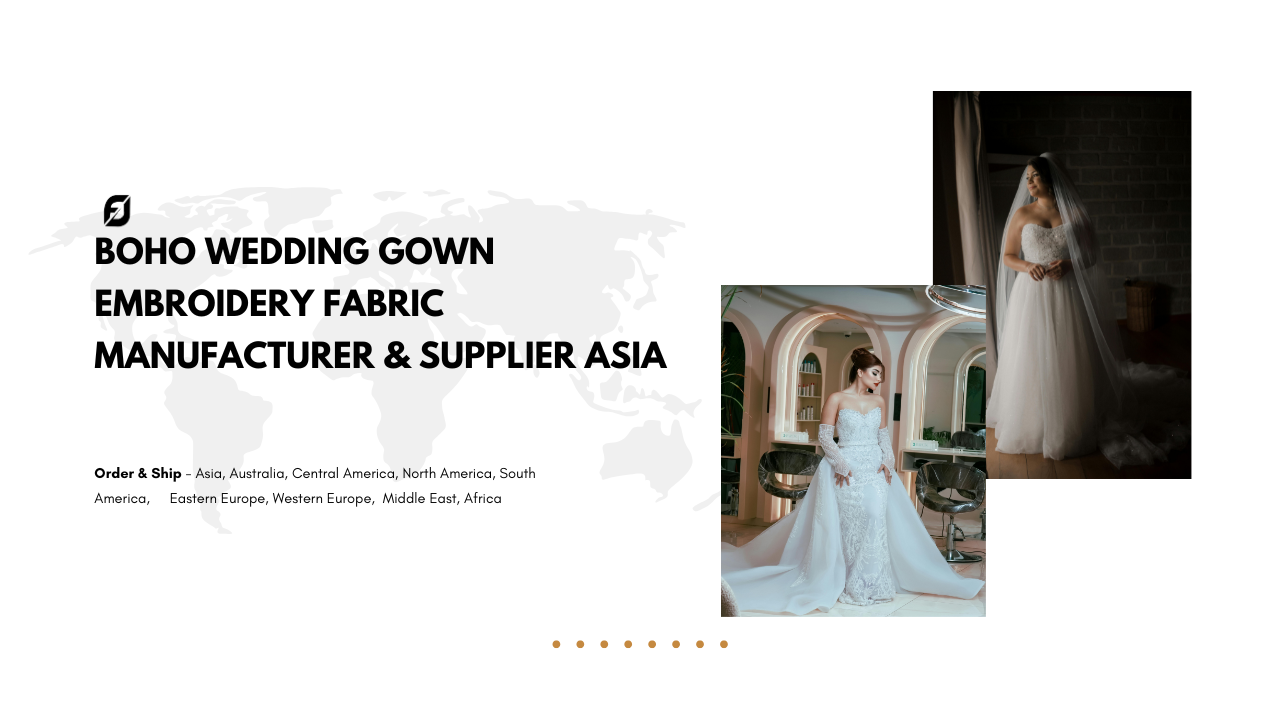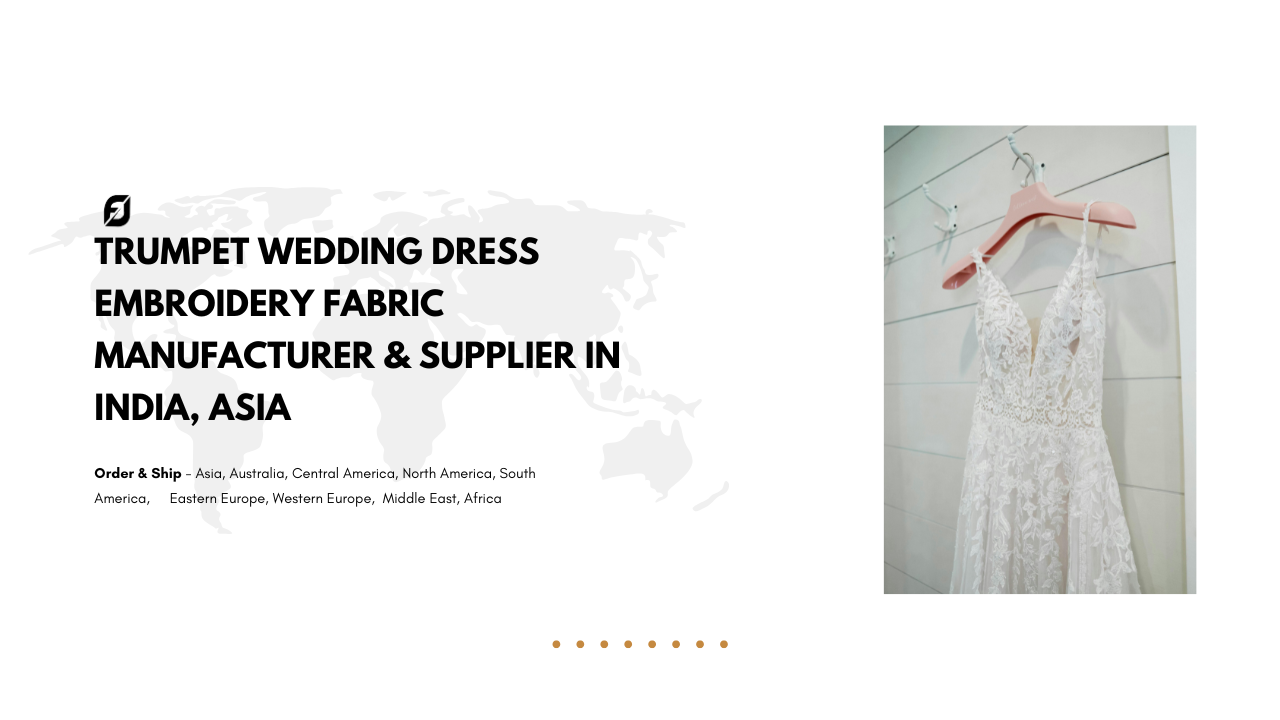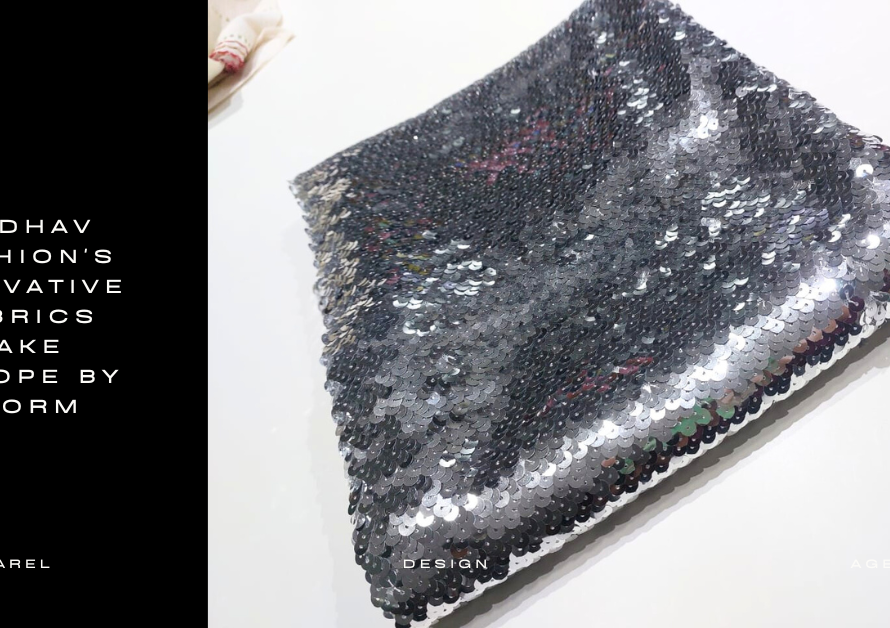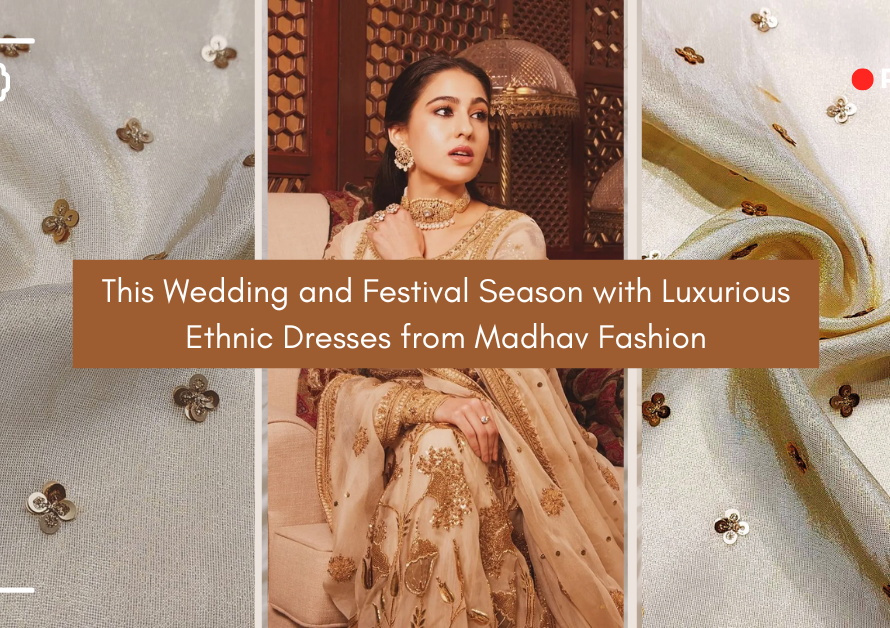In recent years, the demand for designer and printed fabrics has surged across the globe, driven by two primary trends.
On one hand, there is a growing preference for ethnic garments in regions like India, while on the other hand, fast fashion continues to dominate Western markets. This has created a vast market for fabric and garment manufacturers worldwide.
Largest Embroidery Fabric Manufacturers for Bulk Orders: Meeting Global Demand Responsibly
However, this increased production has also contributed significantly to environmental pollution, with thousands of tons of waste generated daily, much of which is challenging to recycle.
Despite these environmental concerns, some companies are stepping up to produce fabrics responsibly. One such company is Madhav Fashion, which stands out as a leading manufacturer of premium embroidered fabrics, digital prints, and plain RFD viscose-based fabrics. Unlike many manufacturers, Madhav Fashion follows a make-to-order production model, reducing waste and focusing on sustainability. Their commitment to using natural and organic materials helps minimize their ecological footprint while delivering top-quality fabrics.
Madhav Fashion: A Leader in Premium Embroidered Fabrics
Madhav Fashion is one of the largest and most respected embroidery fabric manufacturers in Asia, known for its superior craftsmanship and high-quality materials. The company specializes in a wide variety of embroidered patterns, including:
- Allover patterns
- Mirror work
- Kali for lehengas
- Daman for gowns and lehengas
- Butti sequins work
- Beaded fabrics
These fabrics are used in garments for women, men, and children alike, catering to diverse fashion needs. Additionally, Madhav Fashion offers customization options, ensuring that their clients get fabrics tailored to their exact requirements.
Shifting Trends in the Global Market
Over the past few years, buyers from around the world have increasingly turned towards Indian manufacturers like Madhav Fashion. The shift away from traditional fabric hubs like China, Bangladesh, and Turkey can be attributed to a few key factors:
- Exceptional Quality: Indian manufacturers, especially Madhav Fashion, are known for their impeccable attention to detail and quality, ensuring their fabrics meet the highest standards.
- Chemical-Free Processes: More buyers are prioritizing fabrics made with less harmful chemicals, as environmental awareness grows among consumers.
- Reliable Service: The consistency and reliability of Indian fabric suppliers have boosted buyer confidence.
- Sustainable Practices: Madhav Fashion’s dedication to minimizing waste and promoting sustainable production practices is a significant draw for eco-conscious buyers.
Balancing Demand and Environmental Responsibility
While the global fashion industry continues to thrive, manufacturers like Madhav Fashion are proving that it is possible to meet demand without sacrificing environmental responsibility. By focusing on limited production, made-to-order processes, and sustainable fabric choices, they are leading the way in reducing textile waste and setting a new standard for fabric manufacturing.
As fashion trends evolve, the role of sustainable practices in fabric production will only grow more critical. Companies like Madhav Fashion demonstrate that it’s possible to create beautiful, high-quality fabrics while also protecting the planet.
For those in search of premium embroidered fabrics for bulk orders, Madhav Fashion is a top choice, combining tradition, innovation, and sustainability in every piece they produce.
_____________________________________
What makes Madhav Fashion one of the largest embroidery fabric manufacturers in Asia?
Madhav Fashion has built its reputation as one of Asia’s largest embroidery fabric manufacturers through its commitment to premium quality and sustainable practices. Specializing in a variety of embroidered patterns—such as allover patterns, mirror work, kali for lehengas, and beaded fabrics—the company offers an extensive range of fabric designs that cater to diverse fashion industries worldwide. What truly sets Madhav Fashion apart is their dedication to sustainability. They operate on a make-to-order model, producing fabrics based on demand rather than mass production.
This ensures that fabric waste is kept to a minimum. The company also emphasizes using less chemically treated, natural, and organic materials, which appeals to eco-conscious consumers and businesses. Madhav Fashion’s ability to customize orders and provide tailored solutions for women’s, men’s, and children’s garments further strengthens their position in the global market. Their attention to craftsmanship, customer service, and responsible manufacturing practices have helped them become a go-to supplier for buyers seeking high-quality embroidered fabrics. This combination of tradition, innovation, and eco-friendly production makes Madhav Fashion a leader in the industry.
Why are global buyers shifting towards Indian fabric manufacturers like Madhav Fashion?
There has been a notable shift in the global textile market, with buyers increasingly choosing Indian fabric manufacturers like Madhav Fashion over traditional suppliers from countries like China, Bangladesh, and Turkey. One of the primary reasons for this shift is the rising demand for high-quality, ethically produced fabrics. Madhav Fashion stands out by offering exceptional quality and a focus on sustainability. Their use of natural and organic materials, as well as their limited production runs, aligns with the growing consumer preference for eco-friendly fabrics.
Indian manufacturers like Madhav Fashion are known for their attention to detail and their ability to cater to specific design needs, offering customized solutions for their clients. The company’s ability to produce embroidered fabrics with intricate patterns, such as mirror work and sequins, has made them a favorite among designers seeking unique, premium fabrics for ethnic and modern fashion alike. Furthermore, the reliable customer service and timely delivery offered by Indian companies have contributed to this global shift. As buyers increasingly prioritize sustainability and quality, the appeal of Indian fabric manufacturers continues to grow.
How does Madhav Fashion contribute to reducing fabric waste in the textile industry?
Madhav Fashion contributes to reducing fabric waste by adopting a make-to-order production model. Unlike mass production, which can lead to excessive waste, Madhav Fashion produces fabrics based on actual demand, ensuring that unnecessary materials are not created and discarded. This method not only reduces fabric waste but also helps in optimizing resources such as water and energy during the manufacturing process. Moreover, the company emphasizes the use of natural and organic fabrics, which are less harmful to the environment compared to synthetic materials.
They produce high-quality fabrics that last longer, minimizing the need for frequent replacements, which is another way to reduce textile waste. In addition to this, Madhav Fashion focuses on offering premium quality and durability in every product, meaning their fabrics are more likely to be used and treasured for years, rather than ending up in landfills. This combination of ethical production and sustainable materials makes Madhav Fashion a responsible player in the textile industry, committed to reducing the environmental impact typically associated with fabric manufacturing.
What types of fabrics does Madhav Fashion specialize in?
Madhav Fashion specializes in a diverse range of fabrics, particularly focusing on premium embroidered, digital-printed, and plain RFD viscose-based fabrics. Their embroidered fabrics are highly sought after due to their intricate designs and superior craftsmanship. Some of the popular patterns they create include allover embroidery, mirror work, kali for lehengas, daman for gowns and lehengas, butti sequins work, and beaded fabrics. These fabrics cater to a wide variety of garment types, including traditional ethnic wear and contemporary fashion for women, men, and children.
Apart from embroidered fabrics, Madhav Fashion is also recognized for its high-quality digital prints, which are used in modern apparel and designer collections. Their plain RFD (Ready for Dyeing) viscose-based fabrics are another specialty, providing buyers with high-quality materials that can be customized as per their needs. What sets Madhav Fashion apart is their ability to offer these fabrics while adhering to sustainable production practices. By using less chemically treated materials and focusing on organic options, they ensure that their fabrics meet both aesthetic and environmental standards.
How does Madhav Fashion ensure sustainable and eco-friendly fabric production?
Madhav Fashion ensures sustainable and eco-friendly fabric production through several key practices. First and foremost, they adopt a make-to-order production model, which helps reduce waste by only producing fabrics based on specific demand, rather than in large, unsold quantities. This method minimizes the amount of excess fabric that could otherwise go to waste.
Madhav Fashion emphasizes the use of natural and organic fibers, which are less harmful to the environment than synthetic materials like polyester or nylon. By using fabrics that require fewer chemicals and resources in their production, they help reduce their ecological footprint. The company also strives to minimize the use of water, energy, and chemicals during the manufacturing process.
Furthermore, Madhav Fashion’s focus on creating durable, high-quality fabrics ensures that their products have a longer lifespan, reducing the need for frequent replacements and contributing to less textile waste overall. By combining traditional craftsmanship with modern, eco-friendly techniques, Madhav Fashion sets an example for responsible fabric manufacturing in the industry.
What customization options does Madhav Fashion offer to its clients?
Madhav Fashion provides a wide range of customization options to meet the specific needs of its clients. Whether for large-scale bulk orders or specialized projects, they work closely with designers, garment manufacturers, and fashion houses to create bespoke fabric solutions. Clients can choose from various fabric types, including embroidered, digital printed, and plain viscose fabrics, and further personalize them with specific patterns, colors, and textures.
Madhav Fashion excels in producing intricate embroidery designs such as allover patterns, mirror work, butti sequins, and beaded embellishments, tailored to match the client’s unique vision. Additionally, for those looking to create custom ethnic wear like lehengas and gowns, Madhav Fashion offers designs specifically for kali and daman sections. They also provide customized beading and sequin work that can be adjusted based on the garment’s final design. Their focus on made-to-order production ensures that every detail is carefully crafted according to the client’s specifications. This level of customization, coupled with their emphasis on sustainable practices, makes Madhav Fashion a preferred choice for premium, personalized fabric needs.
What trends are influencing the demand for embroidered fabrics globally?
The demand for embroidered fabrics is influenced by several global fashion trends. One major trend is the growing popularity of ethnic and traditional garments, especially in countries like India, where embroidered fabrics are commonly used in bridal wear, festive clothing, and formal attire. The intricate designs and cultural significance of embroidery make it a preferred choice for those looking to celebrate their heritage through fashion. At the same time, in Western markets, there is a growing appreciation for artisanal and handcrafted products, which has led to an increase in the demand for embroidered fabrics in contemporary fashion.
Designers are incorporating embroidery into modern styles, blending tradition with innovation. Fast fashion brands are also experimenting with embroidered details to enhance the appeal of their collections. Moreover, the increasing focus on sustainability and slow fashion has contributed to the rise of high-quality, long-lasting embroidered fabrics, as they align with the movement towards more conscious consumerism. This combination of cultural relevance, aesthetic appeal, and durability is driving the global demand for embroidered fabrics.
How does Madhav Fashion’s make-to-order model benefit fabric buyers and the environment?
Madhav Fashion’s make-to-order model benefits both fabric buyers and the environment by ensuring that production is aligned with actual demand. For buyers, this model offers a high degree of customization and flexibility, allowing them to order fabrics that are specifically tailored to their requirements. This means that designers, garment manufacturers, and fashion brands can receive precisely the amount of fabric they need, without having to worry about excess stock or unnecessary waste.
The make-to-order model also allows Madhav Fashion to focus on producing high-quality fabrics, as each order is crafted with attention to detail and precision. From an environmental perspective, this model helps reduce textile waste, which is a significant concern in the fashion industry. By only producing what is required, Madhav Fashion minimizes the amount of unused fabric that would otherwise contribute to landfill waste. Additionally, this model conserves resources like water, energy, and raw materials, as production is optimized based on real demand. Overall, the make-to-order model supports sustainability while offering buyers a premium, personalized product.
What are the environmental challenges associated with the global textile industry, and how does Madhav Fashion address them?
The global textile industry faces several environmental challenges, primarily related to pollution, excessive waste, and resource depletion. Every day, the industry produces large amounts of textile waste, much of which is non-biodegradable and difficult to recycle. The use of synthetic fabrics, harmful dyes, and chemicals further exacerbates the environmental impact, contributing to water and air pollution. Additionally, the fast fashion model encourages overproduction and rapid consumption, leading to an unsustainable amount of waste.
Madhav Fashion addresses these challenges by adopting a more responsible approach to fabric production. Their make-to-order model helps reduce overproduction and minimizes waste, ensuring that they only produce fabrics based on demand. Furthermore, they emphasize the use of natural and organic materials, which are less harmful to the environment compared to synthetic options. Madhav Fashion also reduces the use of toxic chemicals in their production processes, thereby minimizing water and soil pollution. By focusing on sustainable production practices, Madhav Fashion contributes to reducing the environmental footprint






